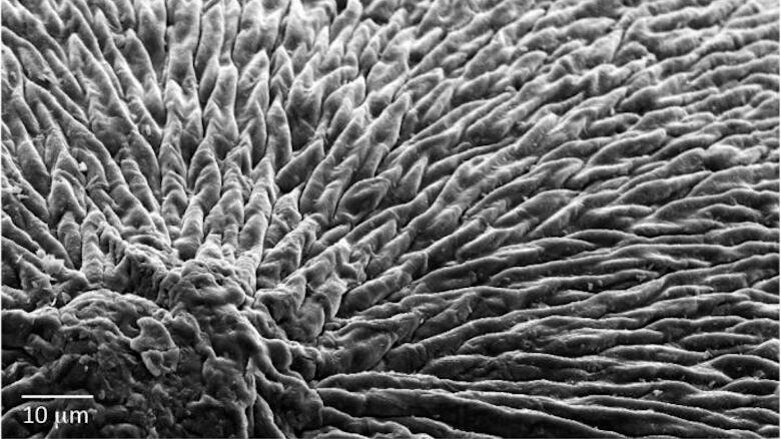LONDON, UK: Unlike many other tissues in the human body, dental enamel does not regenerate itself once it is damaged. In what could potentially be a breakthrough for dentistry, researchers at Queen Mary University of London have developed a new method for growing mineralised materials that could regenerate dental enamel, bone and other hard tissue.
As the hardest tissue in the body, enamel allows our teeth to withstand exposure to acidic foods and drinks, extreme temperatures, and frequent biting forces. Unfortunately, enamel’s inability to renew can lead to tooth pain and tooth loss, conditions that affect a large proportion of the world’s population.
By focusing on a specific protein material that can trigger and guide the growth of apatite nanocrystals, the researchers found that the microscopic prisms created by the material possessed similar physical properties to dental enamel. These structures can be grown over large uneven surfaces and native tissue, opening opportunities for hard-tissue repair.
“This is exciting because the simplicity and versatility of the mineralisation platform opens up opportunities to treat and regenerate dental tissues,” said first author of the study Dr Sherif Elsharkawy, a dentist from Queen Mary’s School of Engineering and Materials Science.
“For example, we could develop acid-resistant bandages that can infiltrate, mineralise, and shield exposed dentinal tubules of human teeth for the treatment of dentine hypersensitivity.”
The study’s lead researcher Prof. Alvaro Mata, from the same school, said: “A major goal in materials science is to learn from nature to develop useful materials based on the precise control of molecular building-blocks. The key discovery has been the possibility to exploit disordered proteins to control and guide the process of mineralisation at multiple scales. Through this, we have developed a technique to easily grow synthetic materials that emulate such hierarchically organised architecture over large areas and with the capacity to tune their properties.”
The study, titled “Protein disorder–order interplay to guide the growth of hierarchical mineralized structures”, was published online in Nature Communications on 1 June 2018.
Tags:
LEEDS, UK: Xerostomia is a prevalent condition especially among older adults, cancer patients and people taking multiple medications. Researchers at the ...
NEWCASTLE, UK: Researchers and dentists from the UK are currently developing a new product from a marine microbe to protect dentures, teeth and gums from ...
RUGBY – A UK survey commissioned by the British Dental Health Foundation and dental company Align Technology has found that over a quarter of people ...
DUNDEE, UK: Though sometimes denigrated as a sign of vanity, self-portrait photographs—selfies, for short—are not without their advantages. One such ...
HARLOW, UK: Now that many questions regarding COVID-19, including its symptoms, risks and recovery time, have been answered, researchers are faced with a ...
Over the course of this 11-part series, the 4dentists group has explored ways to tackle a number of personal and professional challenges by providing advice...
Over the course of an 11-part series, the 4dentists group is exploring ways to tackle a number of personal and professional challenges by providing advice ...
Over the course of this 11-part series, Managing Director of the 4dentists group Richard Lishman will explore ways to tackle a number of personal and ...
Over the course of this 11-part series, Managing Director of the 4dentists group Richard Lishman will explore ways to tackle a number of personal and ...
Over the course of an 11-part series, the 4dentists group explores ways to tackle a number of personal and professional challenges by providing advice and ...
Live webinar
Tue. 24 February 2026
6:00 pm UTC (London)
Prof. Dr. Markus B. Hürzeler
Live webinar
Tue. 24 February 2026
8:00 pm UTC (London)
Prof. Dr. Marcel A. Wainwright DDS, PhD
Live webinar
Wed. 25 February 2026
4:00 pm UTC (London)
Prof. Dr. Daniel Edelhoff
Live webinar
Wed. 25 February 2026
6:00 pm UTC (London)
Live webinar
Thu. 26 February 2026
1:00 am UTC (London)
Live webinar
Tue. 3 March 2026
4:00 pm UTC (London)
Dr. Omar Lugo Cirujano Maxilofacial
Live webinar
Wed. 4 March 2026
1:00 am UTC (London)
Dr. Vasiliki Maseli DDS, MS, EdM



 Austria / Österreich
Austria / Österreich
 Bosnia and Herzegovina / Босна и Херцеговина
Bosnia and Herzegovina / Босна и Херцеговина
 Bulgaria / България
Bulgaria / България
 Croatia / Hrvatska
Croatia / Hrvatska
 Czech Republic & Slovakia / Česká republika & Slovensko
Czech Republic & Slovakia / Česká republika & Slovensko
 France / France
France / France
 Germany / Deutschland
Germany / Deutschland
 Greece / ΕΛΛΑΔΑ
Greece / ΕΛΛΑΔΑ
 Hungary / Hungary
Hungary / Hungary
 Italy / Italia
Italy / Italia
 Netherlands / Nederland
Netherlands / Nederland
 Nordic / Nordic
Nordic / Nordic
 Poland / Polska
Poland / Polska
 Portugal / Portugal
Portugal / Portugal
 Romania & Moldova / România & Moldova
Romania & Moldova / România & Moldova
 Slovenia / Slovenija
Slovenia / Slovenija
 Serbia & Montenegro / Србија и Црна Гора
Serbia & Montenegro / Србија и Црна Гора
 Spain / España
Spain / España
 Switzerland / Schweiz
Switzerland / Schweiz
 Turkey / Türkiye
Turkey / Türkiye
 UK & Ireland / UK & Ireland
UK & Ireland / UK & Ireland
 International / International
International / International
 Brazil / Brasil
Brazil / Brasil
 Canada / Canada
Canada / Canada
 Latin America / Latinoamérica
Latin America / Latinoamérica
 USA / USA
USA / USA
 China / 中国
China / 中国
 India / भारत गणराज्य
India / भारत गणराज्य
 Pakistan / Pākistān
Pakistan / Pākistān
 Vietnam / Việt Nam
Vietnam / Việt Nam
 ASEAN / ASEAN
ASEAN / ASEAN
 Israel / מְדִינַת יִשְׂרָאֵל
Israel / מְדִינַת יִשְׂרָאֵל
 Algeria, Morocco & Tunisia / الجزائر والمغرب وتونس
Algeria, Morocco & Tunisia / الجزائر والمغرب وتونس
 Middle East / Middle East
Middle East / Middle East














































To post a reply please login or register